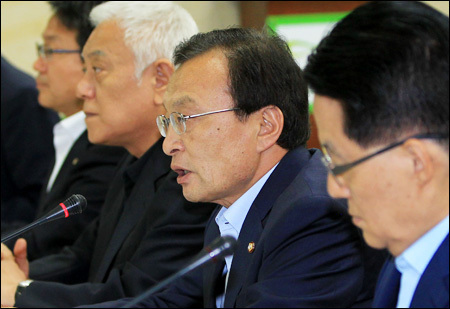At a press briefing in Seoul this week, former Prime Minister Lee Hae-chan, chairperson of the main opposition Democratic United Party, told foreign journalists that when it comes to bringing about peace on the Korean Peninsula, that the positive results in inter-Korean relations achieved by two liberal South Korean presidents, Kim Dae-jung and Roh Moo-hyun, began to fade when South Korea’s current conservative hardline president Lee Myung-bak took office. Adding that under the Lee administration, “military clashes between the two Koreas are not uncommon any longer,” the DUP head advocated finalizing discussions regarding a peace regime on the Korean Peninsula, saying this would be “a path to resolving the North Korean nuclear issue, one of the pending issues that needs our immediate attention, and bringing stable peace to the Peninsula as well as Northeast Asia.”
Moreover, he said, “peace is directly linked to economic issues” and as of last year, South Korea’s national defense budget accounted for 2.7 percent of its GDP. That figure, he said, was much higher than other OECD member nations whose population size was similar to that of South Korea. He explained that “if peace is settled” on the Korean Peninsula, “at least more than 5 billion dollars of our defense expenditure can be immediately injected into implementing policies for improving people’s livelihoods.”
At a press briefing in Seoul this week, former Prime Minister Lee Hae-chan, chairperson of the main opposition Democratic United Party, told foreign journalists that when it comes to bringing about peace on the Korean Peninsula, that the positive results in inter-Korean relations achieved by two liberal South Korean presidents, Kim Dae-jung and Roh Moo-hyun, began to fade when South Korea’s current conservative hardline president Lee Myung-bak took office. Adding that under the Lee administration, “military clashes between the two Koreas are not uncommon any longer,” the DUP head advocated finalizing discussions regarding a peace regime on the Korean Peninsula, saying this would be “a path to resolving the North Korean nuclear issue, one of the pending issues that needs our immediate attention, and bringing stable peace to the Peninsula as well as Northeast Asia.”
Moreover, he said, “peace is directly linked to economic issues” and as of last year, South Korea’s national defense budget accounted for 2.7 percent of its GDP. That figure, he said, was much higher than other OECD member nations whose population size was similar to that of South Korea. He explained that “if peace is settled” on the Korean Peninsula, “at least more than 5 billion dollars of our defense expenditure can be immediately injected into implementing policies for improving people’s livelihoods.”
Try unlimited access
Only $1 for four weeks
-
Unlimited access to all of NK News: reporting, investigations, analysis
-
Year-one discount if you continue past $1 trial period
-
The NK News Daily Update, an email newsletter to keep you in the loop
-
Searchable archive of all content, photo galleries, special columns
-
Contact NK News reporters with tips or requests for reporting
Get unlimited access to all NK News content, including original reporting, investigations, and analyses by our team of DPRK experts.
Subscribe
now
All major cards accepted. No commitments – you can cancel any time.







